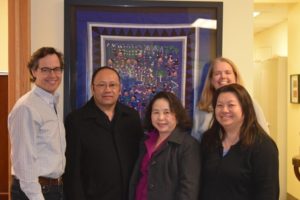News > ILCM In The News
“Their story is pretty extraordinary”
Posted on Apr 04 2017

“Their story is pretty extraordinary,” said Bao Thao, a Staff attorney at the Immigrant Law Center of Minnesota (ILCM). “So many people have touched these files.” She was flipping through the large stack of papers on her desk, the paper trail representing the phone calls, interviews, and bureaucratic red tape that amounted to 12 years of legal work.
On October 9, 2015, Dia Yang saw her husband, Yang Sea Thao, for the first time in 12 years. Dia Yang’s journey had been a long, arduous one. Her road to entering the United States from Thailand began in 2005, when her husband, a 49-year-old asylee, filed a petition for his family to come join him in the United States.
But the family’s story began before the reunification process started, when Yang Thao first fled persecution in Laos. As the Secretary General of the Democratic Chao Fa Party of Laos, Yang Thao was a target of the rising Communist Party. When the Communist Party established itself in the Laotian government, Thao Yang, Dia Yang, and their nine children fled together to a refugee camp in Thailand. However, the refugee camp could not guarantee safety for such a high-ranking Democratic party official and his family. Thao and his family eventually left the camp to go into hiding under false identities in Thailand.
In Thailand, Thao and his family tried to begin their lives again. However, despite the miles they had walked and the precautions they had taken, the Laotian Communist government had pursued Thao beyond the refugee camp to Thailand. Soon, it became evident that Thao had no choice: to truly escape the reaches of the Communist government, and keep his family safe, he had to travel farther. He made the difficult choice to come to the United States on his own in 2003, and to apply for asylum.
While Thao’s family remained in Thailand, Thao turned to anyone he thought could help, first with his petition for asylum, and then with a petition to allow his family to join him in the United States. By the time Thao contacted ILCM and started working with John Keller, then a staff attorney and not yet ILCM’s executive director, Thao’s asylum application had already been approved. John helped him with the next step: filing I-730 petitions for his wife and children. An approved I-730 petition would allow Dia Yang and their nine children to join Yang Thao in the United States.
When John Keller began work on the case, he did not realize that it would last 12 years, years during which Thao never gave up on reuniting with his family.
After several years of legal work, the United States government approved the petitions for Thao’s wife and children, with the exception of married children over a certain age. Despite the good news, the Yang family was not able to celebrate: the Thai government denied the family exit permits. Without exit permits, the family could not leave Thailand to join Thao in the United States.
Only legal advocacy directed at the Thai government could challenge this denial of exit permits. ILCM staff contacted the offices of United States Senators and Representatives, asking them to plead Thao’s case to the United States Embassy in Laos as well as United States Citizenship and Immigration Services (USCIS). The USCIS office continued to give the same response – there is nothing we can do.
“It’s been going on for so long,” said Bao, the last ILCM attorney to represent the family. “It’s not just ILCM that has worked on this case. National congressional staff helped write letters and call – contact the U.S. embassy in Thailand, and USCIS, to see if there was something they could do to move the case forward… Senator Coleman from 2006, Klobuchar and Franken,” she said, tapping her finger on the list of names of those that had provided advocacy on behalf of Yang Thao and Dia Yang’s family.
Despite the pessimism of U.S. and Thai government offices, Yang Thao remained determined. “We couldn’t tell what to do. It was like shooting in the dark, hoping to hit the right target,” Bao acknowledged. When it was clear that there was nothing more ILCM could do, the case was closed.
In October of 2015, Lenore Millibergity, an attorney at ILCM who had also worked on the case, received a call from a private attorney who had been approached by Thao for help. Dia had made her way to Minnesota for her father’s funeral, ten years after Thao filed the petition for her. Now that Dia had found a way out of Thailand on a tourist visa, ILCM could take back the case for investigation and re-evaluation. With the invaluable help of key people in the local USCIS office, ILCM was able to successfully help Dia obtain asylum status and a work card. Dia will be eligible to apply for her green card in late October of this year.
Today, Dia Yang and Yang Sea Thao are together in Minnesota. Their nine children are still in Thailand. While most of them are now married and so are ineligible to come to the United States through the original family petition, Dia and Thao are still trying to bring their 14-year-old daughter to the United States.
When Dia and Yang came to ILCM’s offices to close the case on January 25, 2017, several ILCM attorneys who had represented the family over the past 12 years came to offer their congratulations. “We are so happy that this family can finally spend time together,” said John Keller. “But unfortunately, there is more work to be done.”




